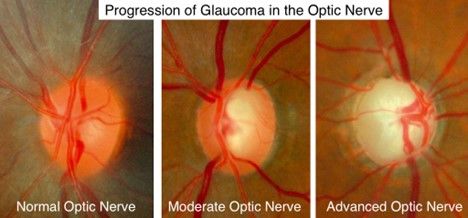
Glaucoma
What is Glaucoma?
Glaucoma is a group of eye conditions that can lead to vision loss and blindness. It is caused by damage to the optic nerve, which is the part of the eye that carries visual information to the brain. The most common cause of this damage is increased pressure inside the eye, but other factors such as genetics and certain diseases can also play a role.
Symptoms of Glaucoma
Most patients with early to moderate stage glaucoma do not experience symptoms. As the condition progresses, symptoms may include:
- Gradual loss of peripheral vision (side vision)
- Tunnel vision in advanced stages
- It is important to note that there is only one type of glaucoma (narrow angle glaucoma) that will cause symptoms of pain or pressure in the eye.
Diagnosis and Treatment of Glaucoma
Because symptoms are so rare in the early stages of glaucoma, a yearly comprehensive eye exam is vital to a timely diagnosis. If during the course of the exam your doctor notes any (or especially a combination of) the following signs, they may choose to have you return to perform additional testing:
- Elevated eye pressure
- Abnormal optic nerves
- Changes in the internal drainage system of the eye
- Strong family history of glaucoma or other risk factors for glaucoma

Risk Factors for Glaucoma
Certain groups of people are at a higher risk for developing glaucoma, including:
- People over the age of 60
- African Americans over the age of 40
- People with a family history of glaucoma
- People with diabetes
- People who have had an eye injury
- People with sleep apnea
- People with abnormally low blood pressure
- People with high myopia (high near-sighted prescriptions)
Treatment for glaucoma may include:
- Medications such as eye drops or pills to help lower eye pressure
- Laser surgery to help improve the flow of fluid out of the eye
- Traditional surgery to help improve the flow of fluid out of the eye
It is important to catch and treat glaucoma as early as possible in order to prevent vision loss. Regular eye exams are crucial in detecting and managing the condition.
Preventing Glaucoma
There is no sure way to prevent glaucoma, but you can reduce your risk by:
- Having regular eye exams
- Maintaining a healthy lifestyle and normal blood sugar levels
- Wearing protective eyewear during activities that may cause eye injury
If you have glaucoma or are at risk for developing it, it’s important to work with your eye doctor to create a treatment plan and schedule regular follow-up appointments. If you have any symptoms of glaucoma, it’s important to see an eye doctor as soon as possible.